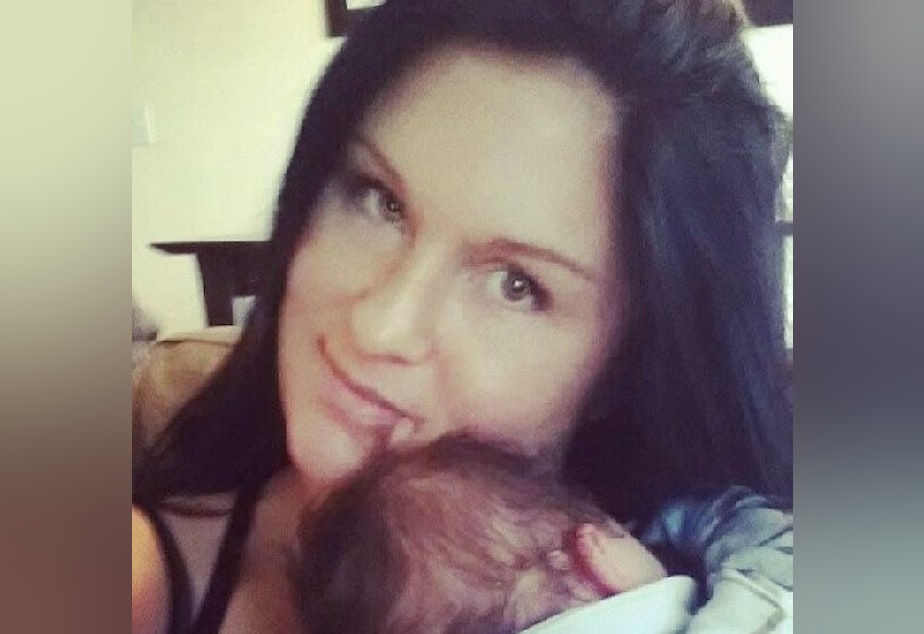Mom Fired By Overlake Hospital After Lactation Room Complaint

Jamie Steeb’s breasts hurt.
Steeb was a nursing assistant at Overlake Hospital in Bellevue. She had returned from maternity leave and needed time to pump breast milk; when she didn’t get breaks, her breasts throbbed with pain. After a while, she said she developed an infection.
Overlake was also supposed to provide her a lactation room “free of intrusion,” according to federal law. But the room she got didn’t have a lock.
“I put a sign on the door but people come in anyway,” Steeb wrote to the U.S. Department of Labor. She was humiliated.
Overlake denies wrongdoing, a hospital spokeswoman said by email.
Sponsored
Steeb’s situation as a pumping and working mom is not unusual. KUOW has found previously that many lower-income moms end up pumping in cars and bathroom stalls – even though employers with more than 50 workers must provide hourly workers with lactation rooms and breaks.
SLIDESHOW: Lactation Rooms Around Seattle (And Beyond)Few moms complain. Many don’t know the specifics of the nursing mothers’ law, or they worry that if they complain, they’ll get in trouble. Or they’re too sleep-deprived to muster the energy to call out a boss.
But Steeb complained. First to her supervisor, then human resources.
And then to the U.S. Department of Labor. Hers was among 43 nursing mothers’ cases nationwide in 2014.
A labor department investigator found two violations: “failure to provide reasonable break time” and “failure to provide adequate space.” The federal law says that workplaces with more than 50 employees must provide hourly workers with a lactation space and breaks.
Sponsored
Overlake says they followed the law: “Overlake is adamant that the law requiring the provision of break times for nursing mothers to express breast milk was not violated and appropriate breaks were provided to the individual.”
Within months of filing the complaint, Steeb was fired. She is suing the hospital for retaliation.
The hospital told the labor investigator there were issues with Steeb’s performance after she returned from maternity leave.
In later court filings, the hospital said that Steeb had provided “poor patient care.”
“Calling a patient a ‘wacko’ and having a number of glucometer errors, where on at least one occasion, [Steeb] scanned the wrong patient,” attorneys for the hospital wrote in response to Steeb’s lawsuit.
Sponsored
Jason Rittereiser, an employment attorney who represents Steeb, said that’s a typical response from employers who have been sued.
“It is very common for the employer to say, ‘They were a bad employee, so we had a legitimate, non-discriminatory reason for firing them,’” Rittereiser said.
Steeb had worked at Overlake for seven years. She emptied trash bins, moved people and took vital signs. She earned $16 an hour.
According to Rittereiser, she received good performance reviews until early 2014, when she returned from maternity leave. That’s when she switched floors and got a new supervisor.
“I had no problem when I worked in W4. The problem started when I go to work on South 4,” Steeb wrote in her statement to the Department of Labor.
Sponsored
Court records show that she found herself at odds with her new supervisor.
One time, Steeb said she took a pumping break soon after beginning her shift. According to the suit, her supervisor reported Steeb to human resources, asking “why she’d be breastfeeding on company time.”
In August, when the Department of Labor informed Overlake they had received a complaint, the supervisor wrote to human resources, “Jamie Steeb reported this, guaranteed.”
In January 2015, a month after Steeb was fired, a labor department representative spoke with two high-level administrators at Overlake.
“We informed them that some nursing mothers were not able to take the break to express milk when they needed to, due to the nature of their work duty,” the report said. “We also informed them that the nursing mothers didn’t have privacy when they’re expressing milk because the door doesn’t have a lock and no window covers.”
Sponsored
The Overlake directors said Steeb had “only put a small sticker note on the door, so maybe the other employees didn’t see that and just popped in.”
A month later, Lisa Morten, the director of human resources at Overlake, told the Department of Labor investigator that the problem was solved: “They had made a big sign that nursing mothers can hang on the door.”

